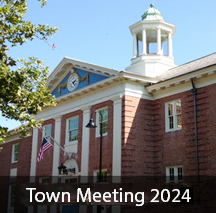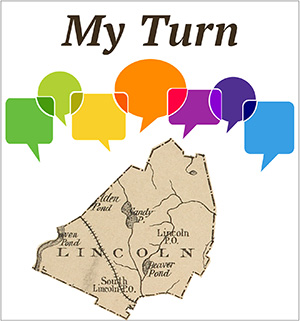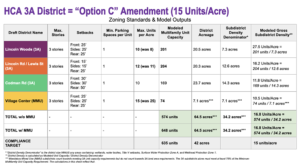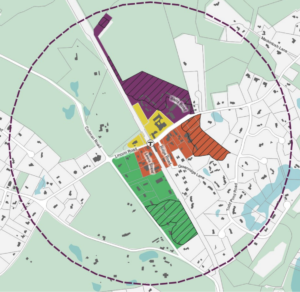 (Editor’s note: After this story was published, a video of the forum was uploaded to the Lincoln TV website and can be viewed here.)
(Editor’s note: After this story was published, a video of the forum was uploaded to the Lincoln TV website and can be viewed here.)
Five candidates for local office took questions at a March 24 PTO forum about the issues likely to confront the Planning Board and Lincoln-Sudbury School Committee (LSSC).
The forum featured candidates from the two contested races on the ballot for Lincoln’s March 31 election. Incumbent Chair Margaret Olson, Rob Ahlert, and Susan Hall Mygatt are vying for two open seats on the Planning Board. Jack Ryan and Charles Morton of Sudbury are in a race for two openings on the LSSC along with fellow Subury resident Eric Poch, who did not appear at the forum.
Neither Mygatt nor Ahlert were in favor of the Housing Choice Act (HCA) rezoning measure that was approved at Town Meeting in March 2024. It was the most controversial and hard-fought issue in Lincoln since the extended debate on the school project.
“Town leaders with best intentions rushed the HCA through and caused some damage that was unfortunate,” Mygatt said. “We should have had more time… there were people who didn’t feel listened to.” However, she added, “I personally would not lead a charge to make any changes” at this point.
“I was wanting us to take a little more time and be a little more careful about the choice of parcels [included in the rezoning] but I always wanted us to be compliant,” Ahlert said. “Now I want to focus on if and when these developers start making proposals, I have a seat at the table.”
“Last year was a painful year shepherding that through our town process. There was a great deal of disagreement, but I think we wound up in a good place” with a measure that’s “in the spirit of the [state] law and as narrow as we can make it,” Olson said.
A major future issue, of course, is what the town will do when a developer inevitably submits a plan for a major project involving the mall and additional housing. Although the revised zoning bylaw includes mandatory design guidelines, “there’s a lot of loose language” there, Ahlert said. “What can we do if a majority of people don’t like [the appearance of a proposed development]? I think the answer is going to be ‘not a lot’.”
It’s probable that those design guidelines will be amended after the Planning Board deals with the first project to which they apply. When writing them, “we did our best in the absence of specific examples and knowledge,” Olson said.
Another issue on the more distant horizon is more zoning mandates from the state to alleviate the housing crisis. Last month, the state Commission on Unlocking Housing Production issued a report with dozens of recommendations including a proposal to abolish rules allowing only single-family housing in certain neighborhoods and allow two-family homes by right on all residential lots in Massachusetts. The City of Cambridge recently abolished its single-family residential zoning requirement, as have several states.
Olson estimated that actual mandates for cities and towns are probably five to 10 years off, “but it does indicate a direction… as a town we need to start thinking and start forming opinions.”
“It’s the HCA on steroids,” Ahlert said, but “I think we should wait and see what happens and not try to solve the problem ahead of time, but we should start talking about it.”
“I have a much more proactive attitude on this,” Mygatt said. Ending single-family zoning would have a huge impact on traffic, schools, town budgets and more. Although the state legislature moves slowly, “once the HCA came down, it came down without regulations and we weren’t ready.”
Asked how rules could be improved to protect trees and natural habitat, Olson answered, “development of any kind is not where the problem is. The problem is climate change and how do we adjust to that.” Compared to towns like Concord and Wellesley, Lincoln’s regulations are “much less protective of trees,” said Mygatt, who chairs the Tree Preservation Study Group. However, concrete proposals are probably several years away, she added.
To better inform the public about upcoming zoning issues, Mygatt and Ahlert recommended coffees or educational forums to offer background on topics such as accessory dwelling units or nonconforming lots. But rather than have more forums and meetings, Olson urged residents to “come to the ones we have.” A consistent problem for the Planning Board and other groups is that “the town wakes up to the fact there’s an issue two to three months before Town Meeting [so] there’s a limited amount we can do” if the issue is especially complicated except postpone a vote until the following year, but that’s not always possible.
Lincoln-Sudbury School Committee
Ryan brings experience, having served on the LSSC from 1998–2010, as chair of the L-S Building Committee, and as a member of Sudbury’s Finance Committee member. “My drive to return is because of my concern about what is going on in Washington and what impact that may have on education here — not just in the Commonwealth but at L-S and in Lincoln and Sudbury,” he said.
Morton, a professor of chemistry at Brown University, has four children in the Sudbury schools. Lincoln-Sudbury “has aspects of a college that we want to preserve; it’s not a cookie cutter place,” he said. “It’s a magic place where I can make sure the committee is enabling the superintendent and principal and teachers to keep delivering a product we’re all very proud of.”
Both candidates agreed that the specter of budget cuts due to federal measures as well as declining local enrollment is the biggest challenge facing the high school. Some parents have pushed for more AP classes; “that could be done, but at the expense of electives that don’t exist at other schools,” Morton said. The L-S staff and administration are already preparing for reductions that may threaten electives, services and activities
“I don’t know what’s going to happen… but we have to make sure we account for every single student and make sure not a single student is left behind,” Ryan said.




